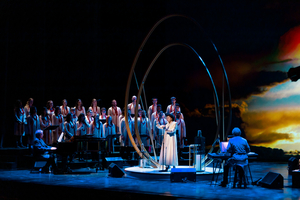Review: At the Kennedy Center, Chandrika Tandon's SHIVOHAM--THE QUEST a Fascinating Musical, Spiritual Oratorio

Spiritual journeys-the happy ones, at least-tend to end the same way; enlightenment, peace, the feeling of being blessed and wishing blessings on all around you. And as is to be expected, any musical spectacle on this theme has a predictable resolution. But each journey is unique, and worth celebrating.
This is where Chandrika Tandon comes into view - a successful entrepreneur, an Indian-American who attended a Catholic school while staying rooted in her Hindu rites at home, Ms. Tandon came to America and thrived. Which means she soon found herself in a crisis many can relate to: having achieved success in the business world, as she was groomed to do, she suddenly realized how unfulfilling this success can be. The urge to find her bliss in other ways-ways that took her away from the normal desire for worldly comforts, worldly accomplishments-took hold, and Tandon has found a worldwide audience for her own personal tale of that quest for spiritual fulfillment.
Her song-cycle, Shivoyam-The Quest, which recently touched down at the Eisenhower Theater at the Kennedy Center, is part oratorio, part jam session, part spectacle, and organized around the many steps to enlightenment she experienced. It's not prescriptive-not a "how to" manual, as much as a travelogue, with a number of beautiful stops along the way.
Given the wide variety of musical forms she evokes, it's clear Tandon is making a statement about the search for enlightenment that is global in its scope. She intersperses personal remarks between episodes, guiding the audience through her journey, and each stop along the way has its own unique musical signature. The mixture of instruments-jazz piano, tabla, violin, sitar, mandolin, and classical Indian flute-blend together in unexpected ways, speaking to the harmony Tandon is trying to evoke.
The stage is dominated by a projection screen, whose sequence is programmed by Patrick W. Lord. The scenes are taken primarily from nature, many of them photos taken by Peter Terezakis, and ranged around the figure of a golden egg, based on the album cover design for Tandon's recording by Clive Jacobson. This projected image is matched by set designer Andy Yanni's large egg-shaped frame downstage center, where Tandon sings and converses with the audience. It's a dominant image, but you are not told what it "means" - instead you are free to associate the egg with whatever concept you wish, and as this image disappears and returns, perhaps it takes on different meanings over the course of the 90-minute event.
Director Allyson Green has created an elegant staging for the performance, with musicians ranged around the stage--one riser for instrumentalists and another for the sizeable chorus, drawn mainly from New York University. Together with her arranger, Matthias "Teese" Gohl, Tandon makes skillful use of the singers, whose choreographed steps and gestures reflect the stages of her quest, while bursting into strikingly beautiful harmonies to accompany her solos. The lyrics, understandably, are a mixture of Hindi and English (surtitles, however simple, would have been nice) and the audience is invited to sing along at various points as well, creating a more communal feel. Snehasish Mozumder's work on the mandolin has a distinctly Indian flavor-a reminder that musical instruments can communicate a world of emotions, not just (as in this case) the hills of Appalachia, and Jay Gandhi's flute work is joyful and complex. Arun Ramamurthy's violin enhances the journey with some beautiful glissandos, while Suryaksha Deshpande's tabla and Jamey Haddad's trap set propel the music forward.
This being a musical performance, the more striking elements-apart from the projections-lie in the variety of musical genres evoked here. There's a distinctly Medieval quality to the opening chant, "Song of Beginning," then the celtic riffs of "Song of the Worldly Dance," not to be outdone by jazz solos provided by Kenny Werner, which find Tandon leaning on his grand piano, as if she were at a cabaret. This, combined with satellite images of the earth and scenes from nature and the stars, is another testament to the all-encompassing vision of Tandon's work.
Chandrika Tandon has released several recordings, one of which was nominated for a Grammy, and it's to be hoped that as she continues to develop her self and her art, she will return to the Kennedy Center with further musings about the path she is now on.
Production Photo: Chandrika Tandon (Center) with chorus and jazz pianist ... (left) and arranger/keyboardist (right, back to camera). Photo by Yassine El Mansouri.
Running Time: approximately 90 minutes with no intermission.
Shiviham-The Quest is one of many international events at the Kennedy Center.
For tickets, call 202-467-4600 or visit: http://www.kennedy-center.org/
Reader Reviews

Videos

